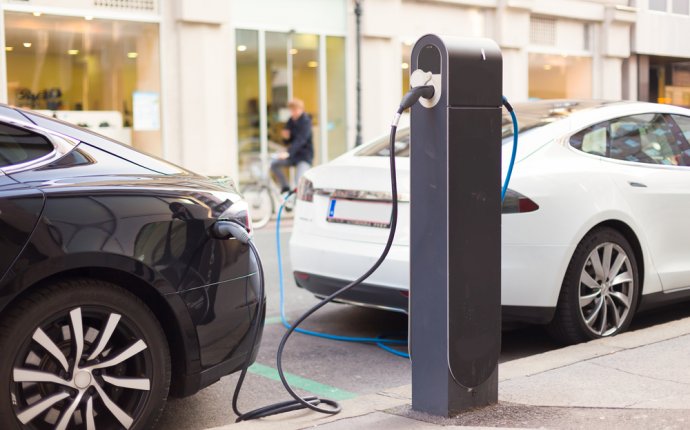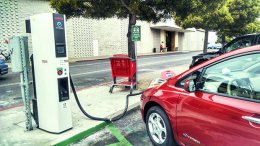
Charging electric Cars Cost
 While various factors make it difficult to set the benchmark price for home charging, we can point to a national average price for a kilowatt-hour of household electricity, as documented by the U.S. Energy Information Administration. For April 2014, the EIA shows an average retail price of $0.1231 per kilowatt-hour (kWh). Of course, your price—depending on where you live, and your specific rate plan—will vary.
While various factors make it difficult to set the benchmark price for home charging, we can point to a national average price for a kilowatt-hour of household electricity, as documented by the U.S. Energy Information Administration. For April 2014, the EIA shows an average retail price of $0.1231 per kilowatt-hour (kWh). Of course, your price—depending on where you live, and your specific rate plan—will vary.
Pacific Gas & Electric in Northern California offers an EV rate plan, which sets the price at $0.04 per kWh when charging after midnight. That’s a third of the national average. Also, let’s not forget that the efficiency of your EV determines how far you go on a kilowatt-hour of energy. Electric cars go between two and five miles on a single kilowatt-hour. That means, the average EV driver will spend three pennies or less on electricity for every mile of driving. Some utilities, like this one in Texas, even give electricity away after midnight!
With these complexities in mind, it’s still possible to examine various public EV charging scenarios to determine if you are likely to pay more or less than your home-based electric fuel.
Free is Good
The majority of public EV charging stations are still free. The economic benefit of those stations is a no-brainer. Nonetheless, the convenience of charging overnight at home—even though your power meter is turning, followed by a utility bill at the end of the month—means that home charging will make up 80 to 90 percent of your charging. You want to be ready to roll with a full pack in the morning, right? Still, if you plan ahead, and use PlugShare to do research, public charging can almost always be free.
To really know your cost in any circumstance, you need to know your car. For example, a 2011 Nissan LEAF can only draw 3.3 kilowatts, while a 2013 and newer version of the same model can draw 6.6 kilowatts (kW). A Tesla Model S can draw 10 kW, and with the dual on-board chargers option installed it can charge up to 20 kW at higher-powered charging stations. A Toyota Prius Plug-in Hybrid can only draw 2.3 kW. In general, most new plug-in hybrids draw 3.3 kW or less, while most new pure battery-electric vehicles (BEVs) draw 6.6 kW or higher. For that reason, a BEV gets a better deal from hourly pricing, but a plug-in hybrid gets a fair deal when paying by the kWh.
 The charging stations at the Community Hospital in Monterey come in multiple flavors. The Nissan CHAdeMo quick charging station, which had been free, requires a .50 per session fee at the time of this publication, regardless of how much energy you pump into your car.
The charging stations at the Community Hospital in Monterey come in multiple flavors. The Nissan CHAdeMo quick charging station, which had been free, requires a .50 per session fee at the time of this publication, regardless of how much energy you pump into your car.
By the Hour
Among the public charging stations that require a fee, most of them use time (rather than kilowatt-hours or kWh) to set a price. For simplicity, let’s say that the price is per hour. Most (but not all) of today’s EVs have a 6.6-kW charger. Logically, if losses are kept to a minimum, you will add 6.6 kilowatt-hours of energy to your battery in one hour. So, dividing that single dollar by 6.6, means you’re paying Vs) draw 6.6 kW or higher. For that reason, a BEV gets a better deal from hourly pricing, but a plug-in hybrid gets a fair deal when paying by the kWh.
The charging stations at the Community Hospital in Monterey come in multiple flavors. The Nissan CHAdeMo quick charging station, which had been free, requires a $6.50 per session fee at the time of this publication, regardless of how much energy you pump into your car.
Among the public charging stations that require a fee, most of them use time (rather than kilowatt-hours or kWh) to set a price. For simplicity, let’s say that the price is $1 per hour. Most (but not all) of today’s EVs have a 6.6-kW charger. Logically, if losses are kept to a minimum, you will add 6.6 kilowatt-hours of energy to your battery in one hour. So, dividing that single dollar by 6.6, means you’re paying $0.15 for each kilowatt-hour. That’s pretty darn close to t.15 for each kilowatt-hour. That’s pretty darn close to the national average for electricity—although maybe two or three times what you might pay if you’re on an EV time-of-use plan. Still, a full charge from empty to full on, say, a Nissan LEAF, will cost about a buck more in public—a reasonable amount to pay for the convenience.
Yet, there are potential gotchas. Some pure EVs, and nearly all plug-in hybrids, use a 3.3-kW charger—instead of the 6.6-kW equipment that has become standard. Charging by the hour with a 3.3-kW charger means you get only half the amount of juice for the same price. It’s still likely to be cheaper than using gasoline, but some of the advantage is erased.
More critically for all EV drivers, some charging locations leave the proverbial meter running until you unplug. So, even when the battery is full, and the electrons have stopped flowing, the price for that charging event continues to wrack up—sometimes creating a nasty bill. For multiple reasons, it’s best to unplug as soon as your battery is full.
By The Session
So far, we’ve only been talking about Level 2 240-volt charging—for which you commonly pay either by the hour or it’s free. But for a 50-kW blast from a DC Fast Charger, it’s more common to pay for a “session.” That’s loosely defined as one time that you plug in. (See our guide to quick charging.)









